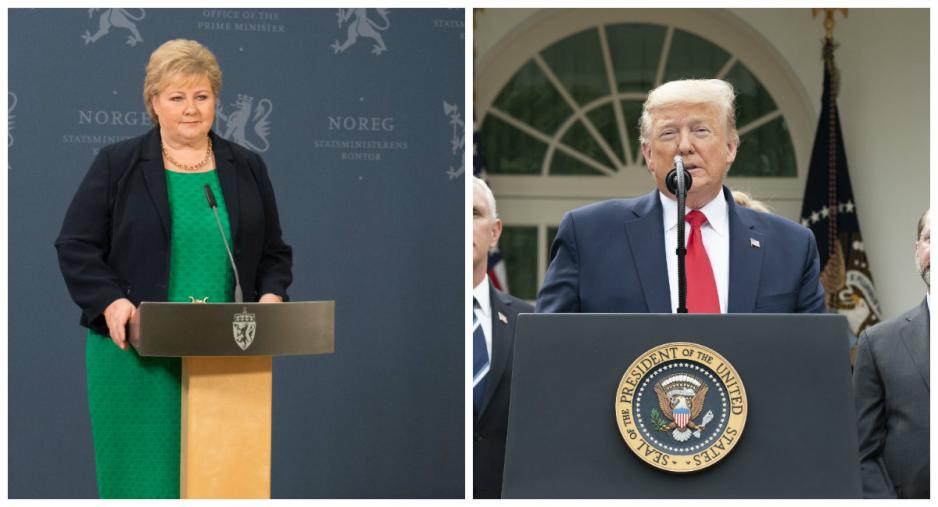The Pandemic Will Force More Solidarity and More Justice

Norwegian Prime Minister Erna Solberg early placed health before the economy when facing the pandemic. With time, even Donald Trump was forced to shut down the economy in order to save lives. That will force a new economic world order. (Photo of Erna Solberg: Arvid Samland, SMK. Photo of Donald Trump: Shealah Craighead/The White House)
Commentary: The financial cricis of 2008 had no consequences for the distribution of wealth in the world. The rich got richer, workers were pressured, and parts of health services were stripped. This time, politicians have made a clear choice: Health over the economy. The question is whether or not this will have other and deeper consequences than previous economic crises. Will solidarity and justice become part of a future world order?
The political choices of direction that were taken when the Corona crisis really hit the western democracies have become aligned over a period of one and a half month.
The Norwegian state oil fund, combined with universal health services, made Norway chose health over economy rather early on. Even the USA, with its exclusively organized health services, and with wealth only available for a select few, was eventually forced to choose health over economy.
Even in the frequently repeated comparison between Norway and Sweden, in which the level of lockdown is at the core, we see a gradual alignment emerging. The great difference between the two countries, which lies in having a state oil fund or not, became decisive for the extent of measures taken.
Even Russia caved in
Even in Russia, where authorities long tried to ignore the ravaging pandemic, because denying social vulnerability is integral to the very nature of Communism, the first cities are now going into lockdown. There, too, health is placed before economy and an imagined ideologic immunity against international earthquakes of the Corona kind.
An extreme difference lies in this; in how the western world faced the financial crisis of 2008 and the way in which we manage the 2020 pandemic.
Choosing health over economy will have long-term consequences
The salvage packages following the 2008 financial crisis reinforced the differences between rich and poor. Shareholders in the biggest banks and financial institutions came out from the crisis, with only minor exceptions, richer than ever, whereas homeowners and workers paid the price. Even if everyone could see that the economic crisis was the consequence of an aggressive and anything but sustainable finance industry, people in the opposite end of the value chain took the beating. People had to leave their houses and homes with debt amounting, and around the next corner, the vultures were lining up with new and even more expensive consumer loans.
We learned nothing
By and large, we learned nothing from the previous financial crisis. When the Corona struck, the international debt burden was bigger than ever. In the USA, the federal debt is currently so high that only 11 percent of the state’s annual income are at disposal when obligations are paid. This portion is decreasing all the time because increased loans are combined with decreasing income through tax reliefs.
In order to carry the burden of this debt, it has been necessary to cut wages and, for instance, public health funding.
The world cut wages and health services
This stands in stark contrast to the solutions chosen under the current pandemic. It is no longer about the individual’s ability to survive, but about a collective social responsibility. The fact that health is placed before the economy, that health is prioritized before the economy is repaired, means that solidarity and justice must be at the core of the future organization of our societies.
Public or private
We can no longer argue that it makes sense to reduce public structures for the benefit of private wealth. We can no longer put pressure on wages for care workers, schools, hospitals and kindergartens because we believe society is best served with organizing public welfare as if it were an airline or a debt collection company.
The wealth that western democracies built up following the 2008 financial crisis was not used to prepare us for a potential pandemic. It was by and large used to increase the differences between poor and rich.
Political priorities in the wake of the pandemic should and must have consequences for our prevailing values also after the pandemic has ceased.
This commentary was originally published in Norwegian and has been translated by HNN's Elisabeth Bergquist.

